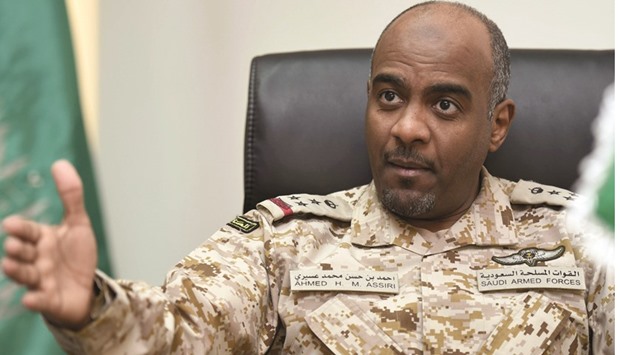A Saudi-led coalition’s major military operations in Yemen are nearing an end, its spokesman said yesterday, but the country will need long-term support to avoid becoming “another Libya”.
During an interview with AFP in his office at a Riyadh airbase, Brigadier General Ahmed al-Assiri also said fighting along the Saudi-Yemeni border had essentially stopped after a mediation effort last week.
Saudi Arabia and several of its Arab allies launched the intervention on March 26 last year to support President Abd-Rabbu Mansour Hadi after Iran-backed Houthi rebels and their allies seized control of large parts of Yemen including the capital Sanaa.
Supported by air strikes and some coalition ground troops, anti-rebel forces have retaken ground, including much of the south.
But they have failed to dislodge the Shia rebels from Sanaa or to completely remove them from the country’s third city Taiz where intense battles continue.
Still, Assiri said the main fighting was nearing an end.
“In any military campaign you have phases.... Today we are in the end of the major combat phase,” he said, adding that the next stages would involve creating a stable security situation and then reconstruction.
But he insisted the coalition would not abandon Yemen, saying it had learned from the US which pulled combat troops from Iraq and Afghanistan before the countries were stable.
Nor does it want to follow the example of Libya, where Western forces helped topple Muammar Gaddafi in 2011 and then left the country to slide into chaos, Assiri said.
“We don’t want that Yemen becomes another Libya, so we have to support the government, go with them step by step until they bring peace and security and stability for the people,” Assiri said.
Asked if the coalition may have to stay for years in Yemen, Assiri would not give a timeframe.
“Look, there is no magic solution... Yemen has been dismantled through 30 years. You cannot fix this in 30 days.”
The Houthis launched cross-border attacks against Saudi Arabia in retaliation for the intervention, with more than 90 people - both military and civilian - killed on the Saudi side of the frontier by shelling and in skirmishes.
The Civil Defence agency said yesterday that a border zone resident had been wounded in shelling from Yemen, the first such report in days.
Assiri said the border was essentially calm since the mediation effort by tribal leaders last week allowed aid to start moving into Yemen at the Alb crossing in Dhahran al-Janoub, northeast of Jazan city.
Last week’s talks were not an “agreement with the militias” but the coalition supported the effort in the interests of Yemen’s stability, he said.
The effort allowed aid to be delivered to villages across the border and helped to ensure that humanitarian convoys are safe, including by the clearance of mines laid by rebels around Alb.
Food and medical supplies have since been sent to Saada, which is the Houthis’ stronghold, he said.
“From time to time” shells are still fired into southern Saudi Arabia, and the coalition reserves the right to retaliate, but the number of cross-border attacks has dropped and the tribal mediation has gone well, Assiri said.
The UN has been pursuing peace talks but the UN’s envoy for Yemen, Ismail Ould Cheikh Ahmed, said last month that “deep divisions” were preventing any progress.
Assiri declined to say how many Saudi soldiers had died in the war or how much it had so far cost.
Money “doesn’t have any meaning” when it comes to national security, he said.
The World Health Organisation says the conflict has left more than 6,200 dead in Yemen over the last year and the UN has warned of a humanitarian “catastrophe”.

Saudi Brigadier General Ahmed al-Assiri, spokesman for the Saudi-led coalition forces fighting rebels in Yemen,
